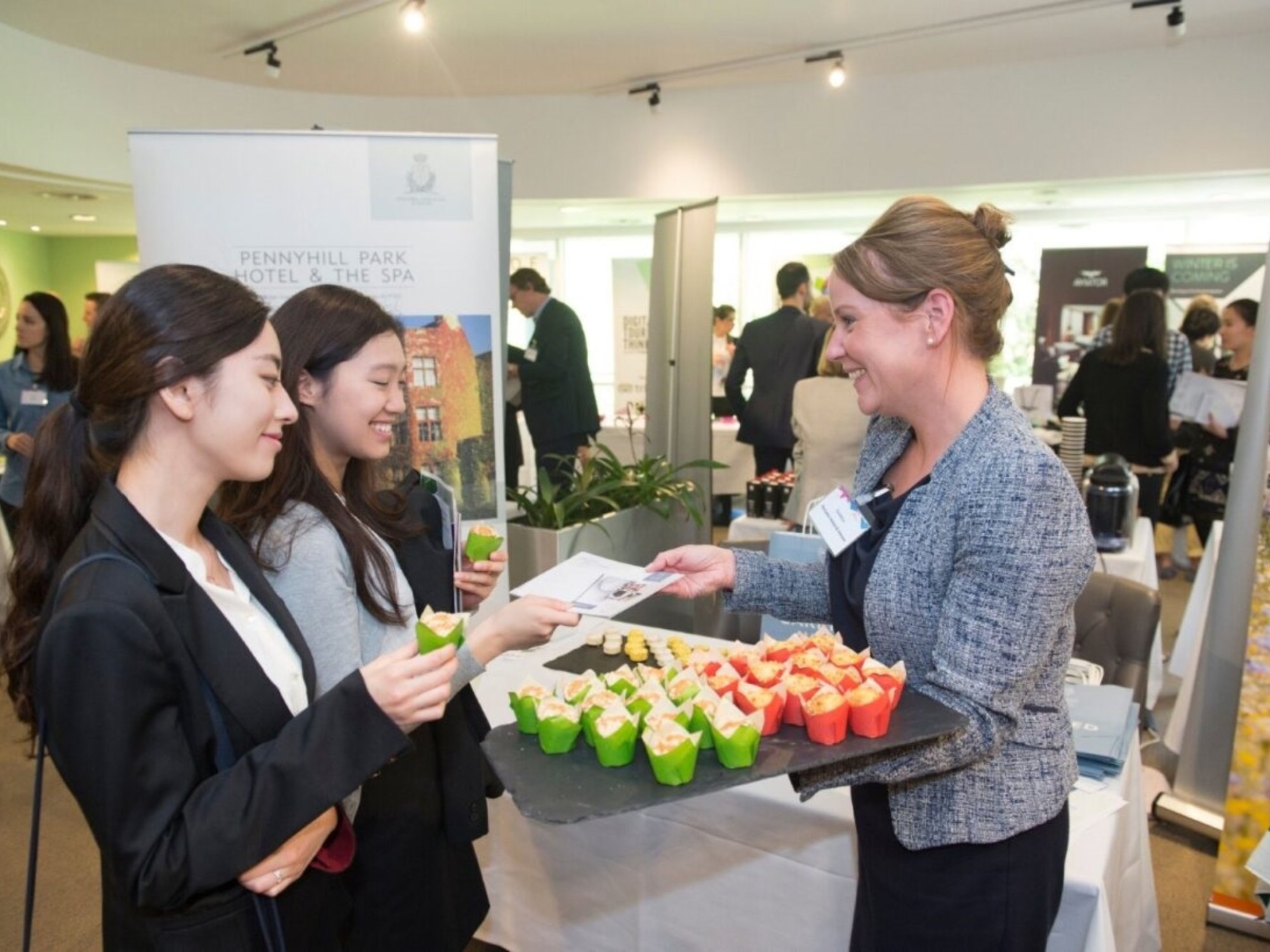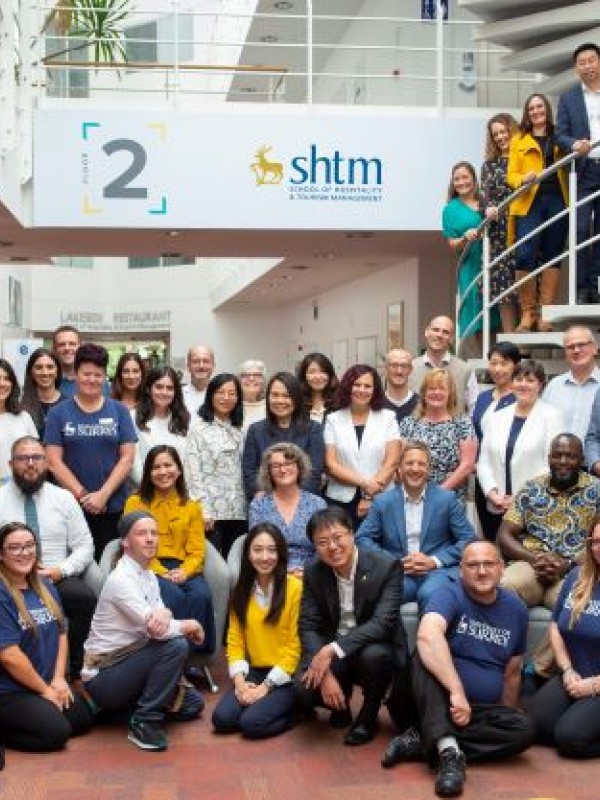
- International Hotel Management
MSc — 2025 entry International Hotel Management
The global hotel industry is being revolutionised by major shifts in consumer demand and buying power. In a post-pandemic world, the industry is seeing a significant increase in demand for new experiences and business models. Innovative thinking, sustainable consumption and production, and digital leadership are at the heart of our International Hotel Management MSc.
Why choose
this course?
- As an International Hotel Management student at Surrey you'll be part of a vibrant global community focused on producing sustainable and positive change in the hotel sector.
- Our dedicated world-leading academics are committed to equipping you with the mindset and resilience to become an effective agent of change who will make a positive difference in the hotel sector.
- Our impressive industry connections mean that senior industry executives regularly give guest lectures to our students - you can use our networks to develop your own professional contacts .
- You’ll benefit from our outstanding track record for graduate employability and will have access to a dedicated careers fair organised by our Tourism, Hospitality and Events Society as well as wider career events within the University.
- Access to membership of key associations including the Institute of Hospitality, Institute of Travel and Tourism and The Hospitality Professional Association, will give you contact with business leaders through mentorship and events. In addition, you will have access to a global alumni network spanning the tourism, hospitality and events sectors.
- Typically, as a student on our International Hotel Management MSc, you won't have a hotel background at an undergraduate level as our MSc programme provides you with critical knowledge and professional skills you need to become a successful hospitality industry leader. If you have already studied hotel management at undergraduate level, we recommend you choose our MSc in Strategic Hotel Management.
Statistics
1st in the UK
Surrey Hospitality and Tourism Management is ranked 1st in the UK and 15th in the world in the QS World University Rankings by Subject 2024
Fantastic graduate prospects
94% of Surrey Hospitality and Tourism Management postgraduate students go on to employment or further study (Graduate Outcomes 2024, HESA)
2nd in the UK
Surrey Hospitality and Tourism Management is ranked 2nd in the UK for tourism, transport and travel in the 2023 Postgraduate Taught Experience Surrey (PTES) with an overall satisfaction score of 98% (CAH3)
What you will study
Dynamic management practices are crucial to managing global hotel companies successfully. We will facilitate your development in the competencies and skill sets that global organisations in the hospitality business are looking for, focusing on operations management, financial management, marketing services, managing people and technologies, service delivery systems and strategic management practices from around the world.
Hotel management will be looked at from ethical, financial, sustainable, cultural and technological considerations, through research and practice towards the creation of effective systems.
You’ll learn about the current contexts and challenges facing international hotel managers in their decision-making and how to consider the value of alternative approaches to business. By the time you graduate, you will be equipped to take on the challenges and make your mark on the industry.
Our taught sessions will be delivered in-person at our Stag Hill campus. All modules are compulsory in Semester 1, while there is choice of two modules in Semester 2.
You can choose one of two pathways to suit your preferred way of learning:
- Dissertation
- Business Plan for Hospitality, Tourism and Events.
Students starting the programme in October will undertake:
- Six compulsory modules including Research Methods (which will be taught during Semester 1)
- Either the Dissertation, or Business Plan in Semester 2
- Contemporary Issues in Sustainability, and Designing Digital Services modules in the summer semester
- Two optional modules.
Students starting the programme in February will undertake:
- Six compulsory modules including Research Methods (which will be taught during Semester 2)
- Either the Dissertation, or Business Plan along with Contemporary Issues in Sustainability, and Designing Digital Services modules in the summer semester
- Two optional modules.
The structure of our programmes follows clear educational aims that are tailored to each programme. These are all outlined in the programme specifications which include further details such as the learning outcomes:
Modules
Modules listed are indicative, reflecting the information available at the time of publication. Modules are subject to teaching availability, student demand and/or class size caps.
The University operates a credit framework for all taught programmes based on a 15-credit tariff, meaning all modules are comprised of multiples of 15 credits, up to a maximum of 120 credits.
Course options
Year 1
Semester 1
Compulsory
The Research Methods module aims to help students to develop an understanding of the research process and prepare students to undertake research leading to successful completion of their dissertation. It enables students to conduct research independently and also provides them with the knowledge, skills and understanding required to develop their proposal for their dissertation. Students are required to identify an area of research and develop research questions to be answered or hypotheses to be tested in the industry context relevant to their course of study. The module covers ideas, techniques, and methods relevant to different stages of the research process, stressing the interdependence of each stage in conducting effective, coherent and rigorous research.
View full module detailsThis module recognises the importance of human resources to the successful operation of Tourism, Hospitality and Events (THE) organisations and will emphasise the strategic aspects of Human Resource Management (HRM) that influence the development of organisations. THE companies need to develop and implement a strategic human resource perspective to achieve competitive success, especially in the current economic climate. The module is intended to provide an opportunity to review theoretical frameworks and concepts underpinning Strategic Human Resource Management (SHRM) along with current trends and issues in strategic HRM for international THE sectors. It therefore approaches the economic, social, environmental and cultural aspects of managing THE businesses world-wide from a critical perspective and asks students to consider how societal and organisational advantage can be achieved through strategic approaches to the management of HR. The module will provide a grounding in the knowledge and application of strategic HRM practices within tourism, hospitality and events sectors across a range of current and strategic HR priorities including employee resourcing, employee development and growth, reward systems, performance management, international SHRM and employee relations. The content of the module will review several case studies from across THE sectors and will consider the role of significant contextual factors like technology, social sustainability and culture.
View full module detailsThis module is designed as an introduction to marketing. The module is divided into two distinct elements, firstly the principles of marketing are covered, and secondly the industry specific application of marketing is analyzed. The module also creates an opportunity to facilitate 'real life' decision-making and enhances a wide range of study skills, such as independent research, analytical skills as well as critical thinking. As such the goal is to contribute to resourcefulness and resilience and to develop digital capabilities linked to the topics covered. Consequently, students develop skills relevant for employability.
View full module detailsThis module is designed to provide students with an understanding of how tourism and hospitality operations function systematically. The systems approach adopted will enable students to critically analyze the interrelationships between systems theory, systems design and systems analysis in tourism and hospitality businesses. This approach will facilitate a critical appraisal of the sustainability and effectiveness of operational types and an evaluation of the potential for improvement. For those students with a background in tourism and hospitality, this module will provide a sufficiently distinct approach for them to gain new insights while offering students without any prior knowledge a framework to facilitate their understanding of new material
View full module detailsSemester 2
Compulsory
This module equips students to develop a strategic approach to the management of international hotel companies. International hotel businesses are complex entities that operate across borders with multiple dynamic opportunities, challenges and contexts. The management of organisations with changing landscapes across regions are further challenged by fast paced innovations in technology and increasing concerns of social and environmental sustainability. Effective management of these global organisations require dynamic strategic thinking, global cultural awareness and innovative management approaches. The module aims to provide students with the knowledge, skills and opportunities needed to become future leaders and managers of international hotel companies. The strategy theory covered in this module will also have relevance to management of other parts of the hospitality sector.
View full module detailsManagers in the service industry need to be able to measure and analyse the financial, social and environmental performance of the business to underpin decisions in the management and investment setting. In this module, students will learn how to critically evaluate financial information and data available in annual reports, financial analysts’ reports and other relevant sources. Using the principles and practices of financial analysis offered in this module, professionals in the service industry will be able to continuously optimise their firm's performance and enhance the profitability of investment decisions.
View full module detailsThe Research Methods module aims to help students to develop an understanding of the research process and prepare students to undertake research leading to successful completion of their dissertation. It enables students to conduct research independently and also provides them with the knowledge, skills and understanding required to develop their proposal for their dissertation. Students are required to identify an area of research and develop research questions to be answered or hypotheses to be tested in the industry context relevant to their course of study. The module covers ideas, techniques, and methods relevant to different stages of the research process, stressing the interdependence of each stage in conducting effective, coherent and rigorous research.
View full module detailsOptional
This module is designed to develop an understanding of revenue management (RM) in the international hotel industry. This has become a major strategic tool in the successful operation of these businesses. The module provides an overview of the RM, looking at all aspects of this activity from a variety of perspectives – strategic, marketing, operations and human resources. Contemporary issues surrounding RM, such as the implications of using algorithm pricing and augmented decision-making, will also be debated from different perspectives.
View full module detailsThis module introduces students to the study of ethics and applies this to tourism, transport, hospitality and events. Within the last decade significant attention has been paid to the issue of ethics and sustainability in these industries. Issues such as: corporate social responsibility, global reporting, ethical consumption, to name but a few, are becoming increasingly central to business practice. This module will offer students the opportunity to reflect upon their own understanding of ethics and corporate responsibility. It will introduce them to a range of theoretical approaches to understanding ethics and ethical responses to business situations, as well as provide the opportunity for in-depth reflection and critique on ‘real life’ scenarios. In so doing, this module adopts the University's curriculum framework, which aims to develop learners with strong Global and Cultural capabilities, Sustainability, Resourcefulness and Resilience while enhancing their Employability and Digital capabilities.
View full module detailsCorporations, governments, entrepreneurs, and various organisations around the world are using data to extract patterns and generate insights to support strategic decision-making and create innovative solutions to business problems. This module will equip you with the fundamental concepts and tools needed to understand the emerging role of visual analytics in service organisations, will show you how to use a leading business intelligence platform -Tableau-, and will inform you how to best communicate your data with industry professionals for making better business decisions. Emphasis will be placed on applications, concepts, visualisation, interpretation, and communication of results, rather than theory and calculations.
View full module detailsStudents will have the opportunity to learn about the different approaches that aim to answer the question: how do I plan, assess and implement a new business venture? Business plans are essential not just for the successful implementation of start-up ventures, but also for continued business growth, including strategic competitiveness. A good business plan underpins business success on all levels and becomes a major guideline to sound management practices. All students will find much value in the business principles inherent to the planning process, which will lead to an enhanced commercial understanding. This module's content and outcomes build solidly upon undergraduate business-related courses from level 4, 5 and 6, as well as any accumulated business experience. It doesn't just reiterate much of the theory previously learnt, but also applies it in a create and innovate way to emphasise creative business development, profitability, growth, and sustainability. It holistically addresses preferred business outcomes and brings all its components together. This module is also designed to give students an entrepreneurial- and industry-focused alternative to the traditional academic dissertation (MANM387).
View full module detailsSustainability has become a major issue in contemporary service operations, including in the hospitality, tourism, transport, events, and related sectors. However, managers do not necessarily understand the specific aspects of sustainability which their business has an impact upon or is impacted by. Further, managers are not always familiar with the tools of sustainability assessment and have limited comprehension of how a robust sustainability audit can aid in reducing operational costs, improving corporate image, and increasing customer patronage. This module will introduce students into the array of sustainability-related issues that a business in hospitality, tourism, transport, or events may face and explain how these issues can be identified and assessed. The module will provide students with an opportunity to undertake a sustainability audit of a business and reflect upon the challenges of such audit's undertaking.
View full module detailsThis module aims to provide you with a number of service design techniques and models by which current and cutting-edge digital technologies can be designed into existing and new service journeys, therefore delivering service innovation through design and technology to create business value. You will be exposed to research-informed, practice-relevant teaching and a series of innovative design workshops using emerging service science and service logic thinking to help develop innovative digital solutions or improve current ones to address current managerial and sustainability issues.
View full module detailsThis module is designed to offer students a critical overview of current hospitality technology systems, their interfaces and integration into functional operations. It informs students about issues, benefits, and problems related to the use and management of information systems in the hospitality business. The module demonstrates how systems support information management, and how the technologies that facilitate the acquisition, storage, processing, analysis, and use of information are valuable business resources. It introduces contemporary and innovative information technologies that will revolutionise hospitality and create new business value.
View full module detailsSemester 1 & 2
Optional
The dissertation is optional for all MSc programmes and is the final element of the programme, providing an opportunity for a sustained period of independent study and research. It allows students to concentrate on topics that are of particular interest to them and it draws upon a range of different aspects of the taught programme particularly the Research Methods module (MANM386). Students can build upon their knowledge and topics learnt from programme-specific modules studies in semester 1 to develop and define their research idea and questions. It also gives an opportunity for students to work independently with an individual supervisor. There are two forms of dissertations: An academic dissertation. This form of dissertation follows the standard academic pattern of identifying a topic arising from a gap in the literature and developing a methodology to explore this area in-depth. A business or applied dissertation. This form of dissertation starts with an emerging business problem, either provided by an industrial partner or with their co-operation in the process, and seeks to provide a research-based solution to or exploration of the problem. All forms of the dissertation seek to develop the same learning outcomes and follow the same assessment criteria. In some cases, taught modules, in addition to Research Methods, may be pre-requisites of taking a particular form of dissertation so that students are adequately prepared.
View full module detailsAcross academic years
Optional
The dissertation is optional for all MSc programmes and is the final element of the programme, providing an opportunity for a sustained period of independent study and research. It allows students to concentrate on topics that are of particular interest to them and it draws upon a range of different aspects of the taught programme particularly the Research Methods module (MANM386). Students can build upon their knowledge and topics learnt from programme-specific modules studies in semester 1 to develop and define their research idea and questions. It also gives an opportunity for students to work independently with an individual supervisor. There are two forms of dissertations: An academic dissertation. This form of dissertation follows the standard academic pattern of identifying a topic arising from a gap in the literature and developing a methodology to explore this area in-depth. A business or applied dissertation. This form of dissertation starts with an emerging business problem, either provided by an industrial partner or with their co-operation in the process, and seeks to provide a research-based solution to or exploration of the problem. All forms of the dissertation seek to develop the same learning outcomes and follow the same assessment criteria. In some cases, taught modules, in addition to Research Methods, may be pre-requisites of taking a particular form of dissertation so that students are adequately prepared.
View full module detailsOptional modules for Year 1 (full-time) - FHEQ Level 7
For further information regarding programme structure and module selection, please refer to the course catalogue.
General course information
Contact hours
Contact hours can vary across our modules. Full details of the contact hours for each module are available from the University of Surrey's module catalogue. See the modules section for more information.
Timetable
Course timetables are normally available one month before the start of the semester.
New students will receive their personalised timetable in Welcome Week, and in subsequent semesters, two weeks prior to the start of semester.
Please note that while we make every effort to ensure that timetables are as student-friendly as possible, scheduled teaching can take place on any day of the week (Monday – Friday). Wednesday afternoons are normally reserved for sports and cultural activities. Part-time classes are normally scheduled on one or two days per week, details of which can be obtained from Academic Administration.
Location
This course is based at Stag Hill campus. Stag Hill is the University's main campus and where the majority of our courses are taught.
We offer careers information, advice and guidance to all students whilst studying with us, which is extended to our alumni for three years after leaving the University.
Our International Hotel Management MSc course will equip you with the essential skills and knowledge needed for a successful career in industry.
94 per cent of Surrey Hospitality and Tourism Management postgraduate students go on to employment or further study (Graduate Outcomes 2024, HESA).
Some of our graduates have gone on to start their careers in the following areas:
- Hotel and restaurant management
- Revenue and asset Management
- Events management
- Catering
- Cruise ships
- Tourism and travel
- Hotel property development
- Hotel technology.
Find out which careers our recent graduates have gone onto after leaving Surrey.


Harshit Chadha
Student - International Hotel Management MSc
"Surrey Hospitality and Tourism Management has a vast experience in the industry which added a lot of value to my experience at Surrey."


Mary Dinah
Graduate - International Hotel Management MSc
"Graduation was amazing, the Alan Turing statue was very inspirational and there were some epic parties!"
UK qualifications
A minimum of a 2:2 UK honours degree, or a recognised equivalent international qualification.
We may be able to take relevant work experience into consideration if you don't meet these requirements. If you have at least one year of relevant experience in a full-time graduate-level role (or a minimum of two years’ experience in a relevant graduate-level part-time role) please provide full details of your role and responsibilities in your personal statement and CV when you submit your application.
English language requirements
IELTS Academic: 6.5 overall with 6.0 in each element.
These are the English language qualifications and levels that we can accept.
If you do not currently meet the level required for your programme, we offer intensive pre-sessional English language courses, designed to take you to the level of English ability and skill required for your studies here.


International Pre-Masters
Prepare for postgraduate study and boost your career prospects. This is an intensive programme of academic subjects, study skills and English language preparation designed to help you succeed.
Recognition of prior learning
We recognise that many students enter their course with valuable knowledge and skills developed through a range of ways.
If this applies to you, the recognition of prior learning process may mean you can join a course without the formal entry requirements, or at a point appropriate to your previous learning and experience.
There are restrictions for some courses and fees may be payable for certain claims. Please contact the Admissions team with any queries.
Scholarships and bursaries
Discover what scholarships and bursaries are available to support your studies.
Fees per year
Explore UKCISA’s website for more information if you are unsure whether you are a UK or overseas student. View the list of fees for all postgraduate courses.
September 2025 - Full-time - 1 year
- UK
- £12,400
- Overseas
- £19,900
- These fees apply to students commencing study in the academic year 2025-26 only. Fees for new starters are reviewed annually.
Payment schedule
- Students with Tuition Fee Loan: the Student Loans Company pay fees in line with their schedule (students on an unstructured self-paced part-time course are not eligible for a Tuition Fee Loan).
- Students without a Tuition Fee Loan: pay their fees either in full at the beginning of the programme or in two instalments as follows:
- 50% payable 10 days after the invoice date (expected to be October/November of each academic year)
- 50% in January of the same academic year.
- Students on part-time programmes where fees are paid on a modular basis: cannot pay fees by instalment.
- Sponsored students: must provide us with valid sponsorship information that covers the period of study.
The exact date(s) will be on invoices.
Additional costs
Commuting (local travel expenses): £50 - Commuting to site visits.
Funding
You may be able to borrow money to help pay your tuition fees and support you with your living costs. Find out more about postgraduate student finance.
Apply online
To apply online first select the course you'd like to apply for then log in.
Select your course
Choose the course option you wish to apply for.
Sign in
Create an account and sign into our application portal.
Please note that we may have to close applications before the stated deadline if we receive a high volume of suitable applications. We advise you to submit your application as soon as it is ready.
ApplyAdmissions information
Once you apply, you can expect to hear back from us within 14 days. This might be with a decision on your application or with a request for further information.
Our code of practice for postgraduate admissions policy explains how the Admissions team considers applications and admits students. Read our postgraduate applicant guidance for more information on applying.
About the University of Surrey
Need more information?
Contact our Admissions team or talk to a current University of Surrey student online.
Terms and conditions
When you accept an offer to study at the University of Surrey, you are agreeing to follow our policies and procedures, student regulations, and terms and conditions.
We provide these terms and conditions in two stages:
- First when we make an offer.
- Second when students accept their offer and register to study with us (registration terms and conditions will vary depending on your course and academic year).
View our generic registration terms and conditions (PDF) for the 2024/25 academic year, as a guide on what to expect.
Disclaimer
This online prospectus has been published in advance of the academic year to which it applies.
Whilst we have done everything possible to ensure this information is accurate, some changes may happen between publishing and the start of the course.
It is important to check this website for any updates before you apply for a course with us. Read our full disclaimer.








